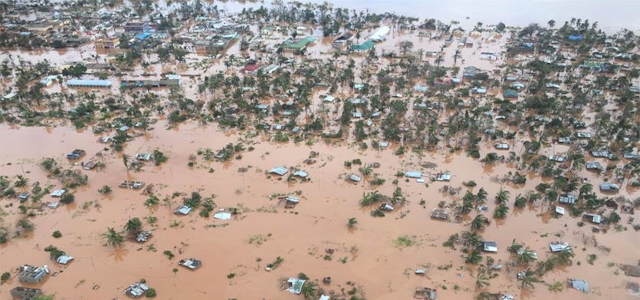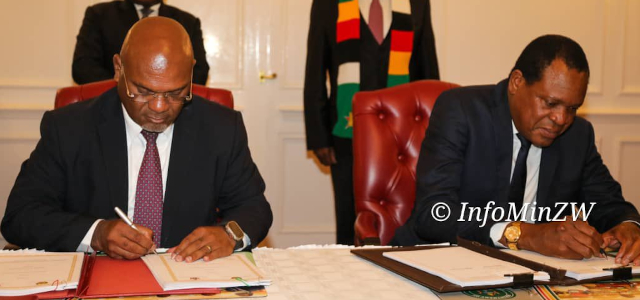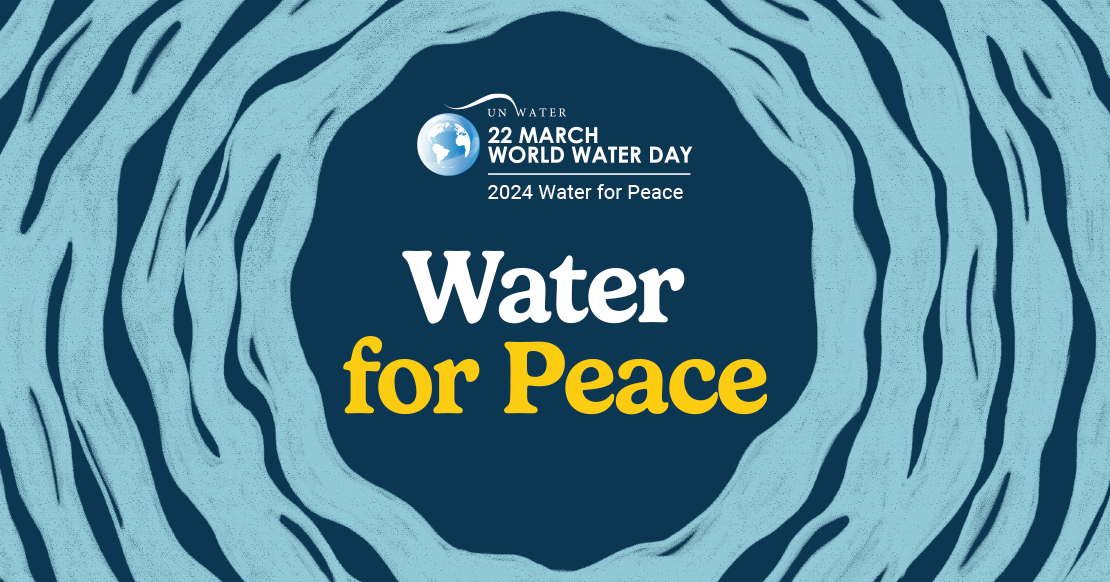As the world commemorates World Water Day on March 22 under the theme of Water and Peace, urgent strategies are required to mitigate the escalating risks of conflicts arising from increasing population pressures in shared river basins. These conflicts often stem from downstream countries experiencing reduced water availability due to upstream water withdrawals for various purposes, including dam construction, agriculture, and industrial activities.
Deterioration in water quality, and quantity, changes in river flows, land degradation, erratic rainfall, and extreme climate events such as droughts, floods, and cyclones are some of the water resources-related challenges within the region. Without proper interventions, these challenges could increase the risk of conflicts among nations and communities sharing river basins.

Rooftops and tops of palm trees poke out from underneath flood waters from Tropical Cyclone Idai's storm surge and river floods in Beira, Mozambique.
Transboundary water cooperation in the SADC region
Transboundary water cooperation in the SADC region is driven and governed largely by regional instruments, mainly the Southern African Development Community (SADC) Revised Protocol on Shared Watercourses of 2000. The protocol, which aims to foster closer cooperation among Member States for the protection, management, and use of shared watercourses in the region, emphasizes on the establishment of water-sharing agreements and shared watercourse institutions, such as river basin commissions and joint water commissions. The SADC Regional Water Policy (2005), and the SADC Regional Water Strategy (2006) provide frameworks for sustainable, integrated, and coordinated development, utilization, protection, and control of national and transboundary water resources in the SADC region. Over the past 20 years, the SADC Secretariat has developed 5-year Regional Strategic Action Plans (RSAPs) on Integrated Water Resources Development and Management to guide the entrenching of cooperation and improve regional governance, as a means of strengthening approaches to water resources management through the building of capacity and the exchange of knowledge.
At the transboundary level, cooperation among SADC countries is governed by bilateral and multilateral agreements. Through its Transboundary Water Management Programme (TWM), Global Water Partnership Southern Africa (GWPSA) is supporting countries in promoting transboundary cooperation within the shared river basins. Within the BUPUSA basins, GWPSA supported the Governments of Mozambique and Zimbabwe in the final negotiations that led to the signing of the Save Water Sharing Agreement and the BUPUSA Establishment and Hosting Agreements. This led to the establishment of the Buzi Pungwe Save Watercourses Commission (BUPUSACOM), the first tri-basin commission in the region. The support was provided under the Global Environment Facility (GEF)- funded USD 6 million transboundary project, being implemented in the three basins by the International Union for Conservation of Nature (IUCN), with GWPSA as the regional executing partner supporting the two governments. GWPSA also supported the finalization of the negotiations for the Buzi water-sharing agreement, through the Buzi, Pungwe, Save Tri-Basin Project under the SADC-GIZ Transboundary Water Management in SADC (GIZ-TWM) Programme, implemented on behalf of the SADC Secretariat.

The Ministers of Water for Mozambique and Zimbabwe signing the Save Water Sharing Agreement and the BUPUSA Establishment and Hosting Agreements in Harare Zimbabwe in May 2023. The signing was witnessed by the presidents of the two countries.
TWM support continues to be given to the SADC Water Division and other basins including the Limpopo where GWPSA is executing another USD 6 million GEF-funded project implemented by United Nations Development Programme (UNDP) in South Africa.
Building enabling environments for transboundary water cooperation
Knowledge of international water law, hydro-politics, negotiations, conflict resolution, stakeholder engagement, and strategic communication is vital for conflict prevention, peace promotion, and equitable resource sharing in Transboundary Water Management (TWM). However, technical experts often lack the necessary negotiation skills. Moreover, challenges like institutional distrust, insufficient recognition of cooperation benefits, and political influence hinder effective TWM cooperation.
The Transboundary Freshwater Security Governance Train Series is one of the capacity-building initiatives GWP together with its partners is using to promote transboundary water governance, international water law, and water diplomacy.
Bringing together like-minded professionals in transboundary water management through communities of practice promotes the sharing of ideas, policies, and developments around TWM towards peaceful resource sharing. Regional multi-stakeholder platforms including biennial SADC RBOs/ SWIs workshops have made a huge impact on knowledge enhancement around transboundary water cooperation in the region. GWPSA continues to support the SADC Secretariat in organising these platforms.
In conclusion, sustainable and cooperative management of transboundary water resources is essential for regional stability, integration, and peace. Efforts to promote water for peace must adopt an integrated approach that recognizes the interconnectedness of water, environment, and human societies, aiming to address water-related challenges in ways that promote stability, cooperation, and sustainable development.
Photo credits: UN-Water, MozSARescue, GEF-BUPUSA project , Ministry of Information, Publicity and Broadcasting Services, Zimbabwe
This Opinion Editorial was written by Dr Loreen Katiyo, Transboundary Water Governance & Environmental Specialist-GWPSA and Leticia Ngorima, Regional Communications Specialist-GWPSA in observation of World Water Day 2024.
